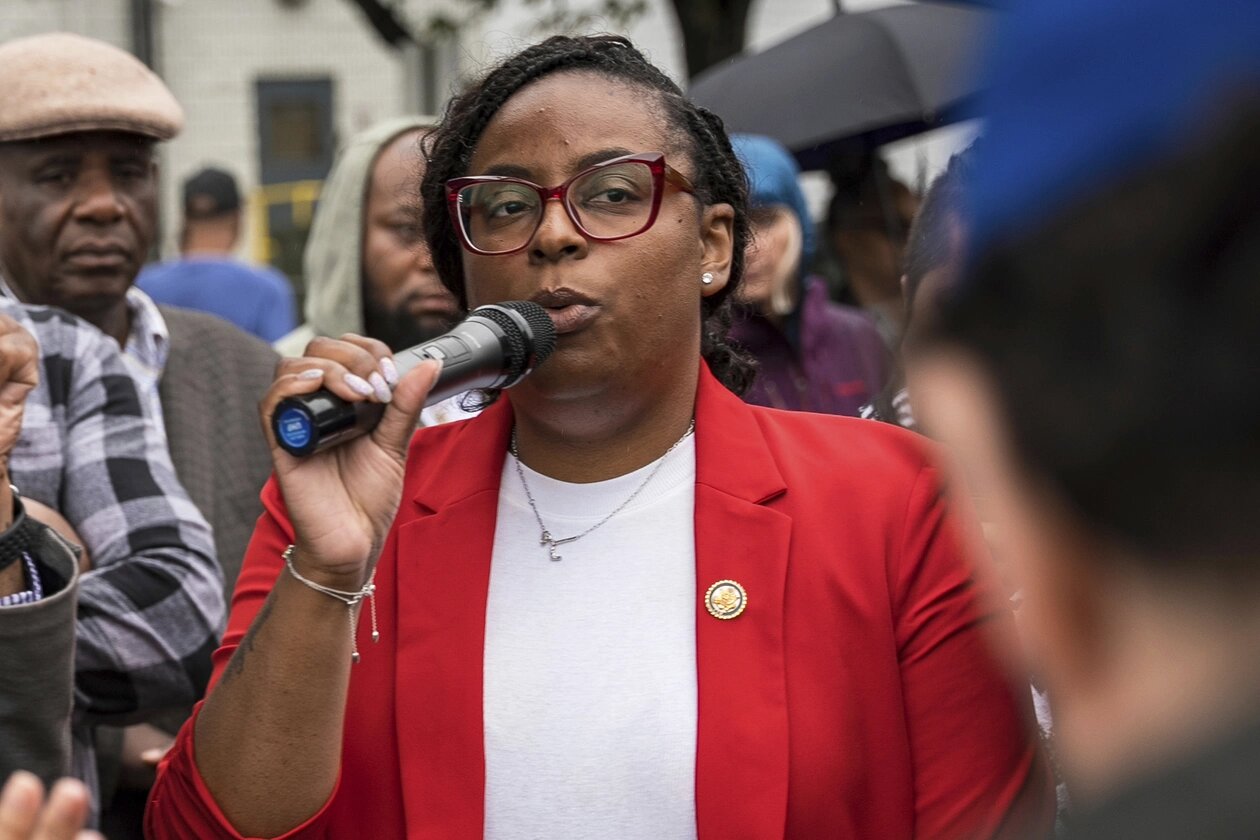McIver was charged following a May scuffle outside a federal immigration facility when two other Democratic members of Congress were also there but not prosecuted.

NEWARK, New Jersey — A federal judge appeared skeptical Tuesday of New Jersey Democratic Rep. LaMonica McIver’s attempts to get charges against her dismissed because they are “selective” and “vindictive.”
U.S. District Judge Jamel Semper repeatedly asked how he could reach the conclusion that the Trump administration was targeting McIver following a May scuffle outside a federal immigration facility when two other Democratic members of Congress — Reps. Bonnie Watson Coleman and Rob Menendez — were also there but not prosecuted.
During a two-hour hearing, Semper, an appointee of former President Joe Biden, did less to telegraph his views of McIver’s other attempt to get the charges thrown out. She argues the charges that she assaulted two homeland security officers and impeded their work should be dismissed because of the Constitution’s “speech or debate” clause, which grants members of Congress a form of immunity that is mostly impenetrable in investigations relating to the official duties of lawmakers.
The alleged assaults occurred during a 68-second span in the midst of a three-hour tour of the Delaney Hall detention facility, when McIver, Watson Coleman and Menendez were part of a chaotic scrum as immigration agents moved to arrest Newark Mayor Ras Baraka on a trespassing charge that was later dropped.
Another judge called the Baraka prosecution embarrassing. Now the McIver case is another test of New Jersey U.S. Attorney Alina Habba, who is battling to preserve her post following a separate August court ruling that she is unlawfully serving in the job. An appeals court heard arguments about that case on Monday.
McIver attorney Paul Fishman argued McIver was prosecuted because she was a Democrat, meanwhile Trump pardoned hundreds of people who attacked police at the Capitol on Jan. 6, 2021, and the Justice Department dropped numerous additional assault cases at Trump’s direction, despite video evidence of the attacks.
“She was charged with something she never would have been charged with if she was a Republican,” Fishman said.
But Semper repeatedly came back to the fact that neither Watson Coleman or Menendez were charged, even though they were in the same scrum as McIver. (Watson Coleman, Menendez and Rep. Nellie Pou were all in the courtroom Tuesday as spectators to support McIver.)
Semper then heard attorneys try to leverage complex and uncertain case law about congressional immunity. He cited case law that worried too much immunity could make members of Congress “super citizens” immune from the law, but he also entertained arguments about how prosecutors could try the case in front of a jury without showing them evidence that steps on her constitutional protections.
“It’s going to be about what the jury sees on those videos,” assistant U.S. Attorney Mark McCarren said, referring to videos of the scrum that the government alleges shows McIver assaulting two officers and impeding the arrest of Baraka.
But defense attorneys said to get those events, the jury needs to hear that McIver was there exercising her oversight authority and hear evidence that federal immigration agents tried to impede her work — work the Constitution’s “speech or debate” clause protects from being used in court. Her attorneys have also cited the Supreme Court ruling last year that gave Trump immunity from criminal prosecution for some actions he took during his first presidential term while fighting to subvert the 2020 election.
“You can’t try the case the way the government pretends they can try it,” Fishman said.
McIver is accused in a three-count indictment of slamming a federal agent with her forearm, “forcibly” grabbing him and using her forearms to strike another agent. Allegations of physical violence by a sitting member of Congress are rare.
At one point, the hearing in front of the judge turned to perhaps the most famous case from history, the caning of Sen. Charles Sumner by Rep. Preston Brooks in 1856. Prosecutors argued that Brooks was prosecuted, suggesting congressional immunity doesn’t cover assaults. But defense attorneys said the case wasn’t analogous, in part because Brooks was a member of the House who had come into the Senate with a specific intent not related to his legislative activity.
Semper also told the government to look at taking down statements that Trump administration officials made about the case that have “absolutely no connection” to the indictment, including remarks suggesting she was trespassing or part of Antifa. Prosecutors said the government had taken down some but conceded other statements remained on social media.
That alone represents a rare concession by the Trump administration: Prosecutors said a half dozen statements had been taken down, while the defense team argued nine others remained online.
Semper said he wanted the government to be proactive in removing such posts and didn’t want to force the defense team to play “whack-a-mole.”
Semper also asked the government to tell him about text messages among agents on the scene.
McIver’s defense attorneys said such messages could undermine the charges by showing agents were not afraid of McIver, a potential element in an assault case.
